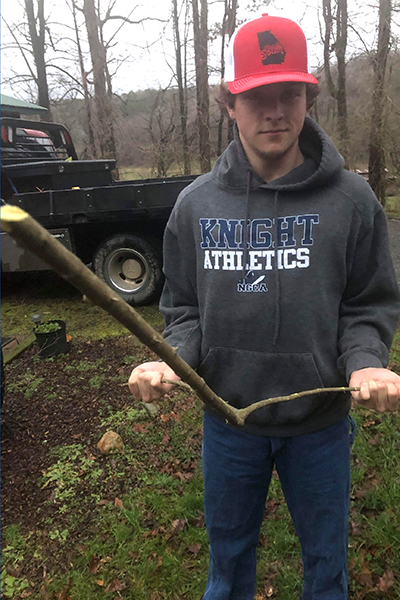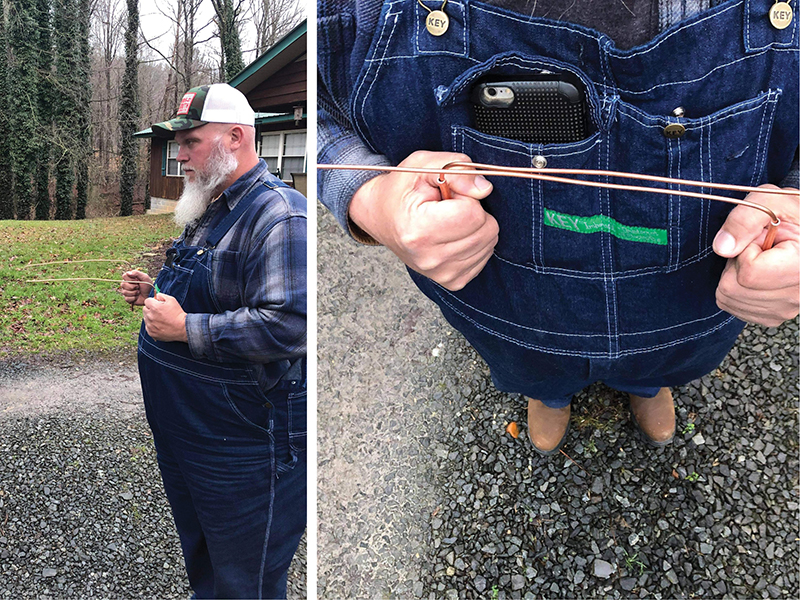Donald “Doc” McClure has been “witching” for as long as he can remember. The use of a forked limb or welding rods to find water underground — also known as “dousing” — is a Gilmer County tradition that stretches back through generations and is still practiced today.
McClure, 82, can share his experiences of finding water all over the country. However, he’s not willing to reveal one trade secret of the skill he learned from his grandfather.

“I can pretty well tell you how deep you gotta go,” he states. “People think that’s a joke, but even some of the old-timers my age can’t do it. They say there ain’t no way to know how deep to go! But I won’t show them my tricks on how deep to go — that’s something I don’t do and let everybody in on.”
However, McClure, a Gilmer County native who has worked all his life in the construction and grading business, will divulge some of his prowess in finding water.
“I use a green stick — a forked stick — or I can use solid-brass dousing rods,” he said. “You can’t hold them tight, you gotta let them loose. You walk with them, and when they cross over, that’s where the water is. I just watched (my grandfather do it), and I’ve got five brothers and none of them can do it!”
McClure, who said he’s doused water in every state he’s worked, has done it “hundreds of times” in Gilmer County.
“I’ve done a lot of subdivisions where they wanted to put community water in, (drilling) five or six wells, and you can put five or six houses to a well,” he explained. “A lot of them (drilling companies) went in and tried to drill a well, and would go 800-900 feet and find no water. I told them they were drilling in the wrong place, and they’d say, ‘How do you know where to drill?’ So I’d get my rods out, and one time found it at 10 foot. I said, ‘You set up right here and you’ll hit water.’ And they hit it.”
McClure said witching for underground water instead of guessing where it may be can save a property owner hundreds, if not thousands, of dollars.
“I’ve done a lot of deep wells in subdivisions, and where they were trying to go 400-500 feet deep, I’d show them where to go 80-110 feet — at 20-30 gallons a minute,” he informed. “That’s a big difference when you’re talking about $16-$18 a foot to get a hole drilled.”
Ricky Boring, who at one time employed McClure, says the senior water-finder is “one of the best witchers I’ve ever seen.”
“He’s about 83 or 84 years old, but he works every day,” Boring said. “He can always find water, and he’s witched for a lot of the well drillers too. He can usually tell how many gallons a minute it will produce. He’s pretty good at it.”
What’s the science?
Tracy Jenkins, a Gilmer schoolteacher, has successfully doused with her dad and grandfather to find sites for wells, septic lines and water lines.
“It was definitely my dad, Harold Underwood,” she said. “I’d hate to say for sure about Papaw, Rev. Cleve Underwood, from Cherry Log. I don’t remember ever seeing him do it, but he was always with us when we were doing it. There were three of us kids, and I was the oldest, so I was definitely a daddy’s-girl tomboy. He had me try it, and tested me blindfolded — and I just couldn’t believe it was happening. It was like, ‘Oh, my gosh, this is not just something he’s doing to trick me. This really is happening!’”
Jenkins disclosed her father often cut a fork from one of the pear trees on their property to find water when she was growing up.
“We also had willows, and he would use that occasionally, but he liked fruit trees the best,” she said. “He would get a certain-size fork and make sure there were no more little limbs coming off of it. One time we were looking for this point underground where someone had had a trailer out in Boardtown so we could find the septic (tank), and we were able to locate it.”
Harold Underwood had a knack for helping people find old wells on their property, Jenkins noted.
“I don’t know if he was as good as some people who could tell you how deep to dig and how strong the current was — I just don’t know; I was in my teens and early 20s when we were doing that,” she said.
Her husband, Brad, also a schoolteacher, didn’t believe people could find water underground with a stick.
“He was so skeptical he was saying, ‘There is no way! Y’all are making this up. That won’t happen,’” Tracy recalls. “I said it may not happen to you, but we’re going to test it. My dad was a big cut-up, so he wanted to see too whether Brad could do it. So we put Brad up in mom and dad’s house, and made sure he was blindfolded. Dad marked a spot, and I went behind him (dousing) and ended up marking the same spot. We put something there that was natural, so there was no way Brad would know. But we blindfolded him anyway.
“Brad had been a football player, a big strong guy — and still is — and we gave him that fruit-tree limb, and set him off to go and see what would happen. I’m not kidding, he was squeezing (the limb) so hard to try and prevent it from turning down that it stripped the bark off the branch and went ahead and pointed down at the exact spot that we had marked!”
Brad remarked, “It has nothing to do with whether or not you believe in it — because I didn’t believe in it, and it still happened!”
Tracy said she and her father always pointed the forked limb up, and as they walked and neared water, it would slowly start pulling down.
“If it starts pulling strongly, of course, it’s a better source of water than just a little bitty branch that’s underground,” she said.
“It just gradually pulls down and points. And if you keep walking, it will point backward between your feet. It’s that accurate.”
Tracy said her sister and mom could not douse water with a limb.
“So that’s the mystery, is why some people can,” she wonders. “What’s the science behind that? Because obviously, God created everything, and so I believe there’s science in that. I can remember years ago Gary Hyde and I were trying to figure it out as teachers.”
‘Twist out of your hand’
Mark “Bubba” Aaron said his grandfather, Norman Beavers, also used a forked peach tree limb.
“He would hold it tight in his hand, and if he found a good source of water underground, it would wring the limb into nearly pointing down where the water was,” he said. “I can remember when I was a kid he did a new well for himself and he witched it. They found water right where he said, and when they drilled the well, he told them that they would find water around 100 feet — and they hit water at 90 feet. They tried to pump it out and couldn’t, so they pulled the rig out, and before they could put the cap on it, the water started flowing and ran out the top for days. It’s one of my favorite memories of childhood.”
Kenny Wishon said although both he and his father, Jerry Wishon, can witch water, “yet we are opposite polarity. We react differently — crossed rods versus opening of the rods — to the current given off by the flow of water or electricity.”
“Once we located water on a site, and the property owner hired a company to ultrasound the property to locate a place for the well,” he continued. “He pinned the same location as we did.”
They were visiting some friends who lived in the Amish country of Ohio and got to talking about witching.
“One of them asked us to check for water because he was going to have a well drilled,” Kenny recalled. “We found a spot, and four years later we returned, and he was thanking us for finding a great well site. He said the well was plentiful with good water.”
Scott Jones grew up in Boardtown and said a friend at school got him interested in water witching.
“Me and my friend, Greg McClure, learned how to weld under Mr. (E.L.) Partridge at (Gilmer) high school,” he said. “One day Greg just rose up and said, ‘You can find water with these welding rods,’ and I said, ‘What?’ He said, ‘Yeah, just balance them out on the ends of your fingers, on each finger, and when you come to water, an underground power line or an underground water line, it’ll start coming together.’ So I did, and sure enough it worked. They’ll come together strong or weak depending on the source of water. If it’s a weak source, it’ll just barely move the rods a little bit.”
Jones, whose family goes back to the Cherokee Land Lottery in Gilmer County, has also used “forked sticks like other people do.”
“We’ve found underground power lines and water lines to keep from getting confused about what’s what,” he said. “Usually when you’re finding those they’ll be in a line, so if you’re trying to just find water, you have to get away from that area. The forked sticks will actually twist out of your hand on a strong pull. You just point straight out, and it’ll pull down.”
Jones was asked if those who can douse or witch for water charge for their services.
“I’ve never known of anybody charging. I ain’t charged anybody. I’ve done it for myself and my neighbors and family, but never advertised or anything like that,” he replied.
Still, he’s had his concerns about the practice of “witching.”
“I always heard it was witchcraft, witching for a well, and I’ve always been hesitant to do it,” he admitted. “If it’s proven to be witchcraft, I am quitting ... that one lady said on a (social media) post that it was a ‘divining rod’ and you can find it in the Bible. But I’ve never found it, and she didn’t tell me where it was at. I sure don’t wanna be doing no witchcraft. If it’s divining rods, that’s a good thing then.”
Doc McClure observed, “They call it witching, but it’s not witching — it’s a fact.”
(By Mark Millican, Home Garden & Garage magazine 2021)

